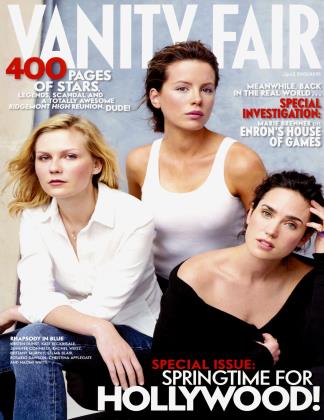Sign In to Your Account
Subscribers have complete access to the archive.
Sign In Not a Subscriber?Join NowRad Boys
FANFAIR
CELEBRATING L.A. SKATE GREATS IN STACY PERALTA'S DOGTOWN AND Z-BOYS
The first skateboarders ever to ride the walls of empty swimming pools, the Z-Boys became overnight street legends in the mid-1970s and then, just as quickly, disappeared from view. In Stacy Peralta’sDogtown and Z-Boys, a nostalgic new documentary by one of the original Z-Boys, this insolent crew from the slummy beaches of Venice and lower Santa Monica emerge as the funky, soulful progenitors of today’s extreme-sports nation. Narrated by Sean Penn and featuring vintage super-8 footage of skate greats such as Tony Alva and Jay Adams, the movie belongs next to Pumping Iron and The Decline of Western Civilization as a crucial portrait of one of L.A.’s influential secret worlds. Says Adams, from Hawaii, where he recently served time for a drug conviction, “It surprises me it took so long for everybody to figure out how cool it was.” Z stands for Zephyr, an eccentric surf shop that borrowed the graphic style of local Mexican-gang graffiti and hot rods. The cholo look became a rallying point for the mission at hand: getting rad. Explains Peralta, “If you went to Hermosa, what you saw on guys’ boards were mermaids, rainbows, and cosmic children. In Venice, it was rats, skulls, swazis—not as in Nazi Germany but as in extreme dedication to the activity.” In one of the film’s funnier moments, team impresario Skip Engblom sheds light on the insular Zephyr logic: “I fantasized about chicks with huge hair and lowriders. Little blonde girls named Buffy weren’t my scene.” Seeing the Z-Boys in action—longhaired, low-slung, ecstatic, aggressive, carving the hallowed embankments of Paul Revere High School—you have to agree when one of them brags, “There was no one in our group that wasn’t flowing.” Aside from intuitive athleticism and complete disregard for personal safety, what made the Z-Boys stand out was attitude. Dogtown was a state of mind as much as it was a place. “We didn’t think we were doing anything wrong to empty somebody’s pool when they weren’t home,” Adams says of L.A.’s seminal skate sessions. “It seemed like a good idea to me.”
DUNCAN BOCK
 View Full Issue
View Full Issue






Subscribers have complete access to the archive.
Sign In Not a Subscriber?Join Now